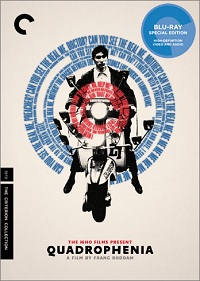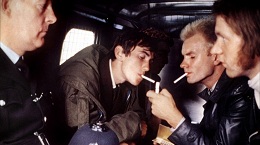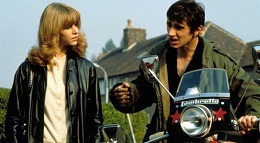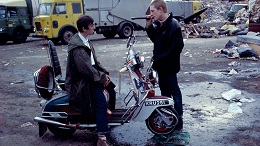 When I was a teenager, I rented Quadrophenia, the rebellious 1979 British movie set in 1964 and based on the rock opera by The Who. The accents were really strong and hard to understand, the colors were dull and washed-out, and the screen was square.
When I was a teenager, I rented Quadrophenia, the rebellious 1979 British movie set in 1964 and based on the rock opera by The Who. The accents were really strong and hard to understand, the colors were dull and washed-out, and the screen was square.
What a difference a hi-definition reissue makes.
Criterion’s new Blu-ray of Quadrophenia has an immersive 5.1 surround sound mix that brings out both the music and the dialogue, and the new digital transfer looks fantastic, retaining all the grimy detail of working-class Great Britain and restoring the widescreen image of its theatrical presentation.
Phil Daniels plays Jimmy, an alienated young adult who finds refuge in the subculture of the mods, who are constantly at odds with the rockers. It doesn’t help that one of Jimmy’s old friends (a young Ray Winstone) is now a rocker too. Jimmy clings to the group and it gives him identity while he lashes out at everything else in his life: his parents, his job, girls, himself.
 Quadrophenia has the rare quality of always seeming on the edge of something. Jimmy spends his money on new suits and pills so he can hang out with the mods and be his true self, but when he gets hung up on a girl, things never seem to work out right. Sting, in his first film role, plays the Ace Face — the coolest of the mods — and when Phil starts to see beyond Ace’s facade, everything he has put faith in suddenly is gone.
Quadrophenia has the rare quality of always seeming on the edge of something. Jimmy spends his money on new suits and pills so he can hang out with the mods and be his true self, but when he gets hung up on a girl, things never seem to work out right. Sting, in his first film role, plays the Ace Face — the coolest of the mods — and when Phil starts to see beyond Ace’s facade, everything he has put faith in suddenly is gone.
The beauty of Quadrophenia is that, unlike The Who’s Tommy, it’s not a musical. The band isn’t acting and the music of The Who provides the soundtrack, along with period-appropriate tunes from the mid-60s.
Director Franc Roddam shot the film with a gritty, realistic feel and the themes of youthful rebellion and confusion are absolutely timeless, magnified by the specificity of the setting rather than being limited by it. The young actors seem to have lived in their roles for years — the result of much rehearsal with Roddam before anything was shot — and it’s especially interesting to see Winstone (who also played a rocker in the 1982 cult “punk” film Ladies and Gentlemen, the Fabulous Stains) and a young Timothy Spall in his second role ever.
 When you are a teenager, everything is magnified, so betrayal can feel especially painful. Quadrophenia captures the anger, the innocence, the hurt, and the rage of those young adult years and with The Who blaring in the background, gives you something to scream about.
When you are a teenager, everything is magnified, so betrayal can feel especially painful. Quadrophenia captures the anger, the innocence, the hurt, and the rage of those young adult years and with The Who blaring in the background, gives you something to scream about.
The commentary with Franc Roddam and cinematographer Brian Tufano (who went on to lens Trainspotting and Billy Elliot) is full of great stories about conceptualizing, casting, and shooting a film on a low budget with no stars and one of the most famous rock bands in the world looking over your shoulder. From all accounts, there was a lot of trust involved.
Roddam says in the commentary that Johnny Lydon (Rotten) was interested in the part of Jimmy but that the insurance company wouldn’t let them. He says he convinced everyone to go with Daniels anyway because he was an actor. In the interview with The Who’s manager Bill Curbishley, however, Curbishley says Lydon turned it down because he didn’t want to be beholden to The Who’s songs and “live out any of Pete Townshend‘s fantasies.”
 Other great bonuses include the 1979 episode of BBC’s Talking Pictures, which goes behind-the-scenes and features a review of sorts of Quadrophenia, placing it in the pantheon of great British films right at the time of its release. Two French TV shows about the real-life rivalry between the mods and the rockers from 1964 and 1965 are very cool documents f the times an feature interviews with Townshend and then-Who manager Kit Lambert.
Other great bonuses include the 1979 episode of BBC’s Talking Pictures, which goes behind-the-scenes and features a review of sorts of Quadrophenia, placing it in the pantheon of great British films right at the time of its release. Two French TV shows about the real-life rivalry between the mods and the rockers from 1964 and 1965 are very cool documents f the times an feature interviews with Townshend and then-Who manager Kit Lambert.
If that’s not enough, the Who’s sound engineer Bob Pridden talks all about the impressive new mix (DTS-HD Master Audio on the Blu-ray edition) and gives a restoration demonstration that goes way over my head!








Comments on this entry are closed.